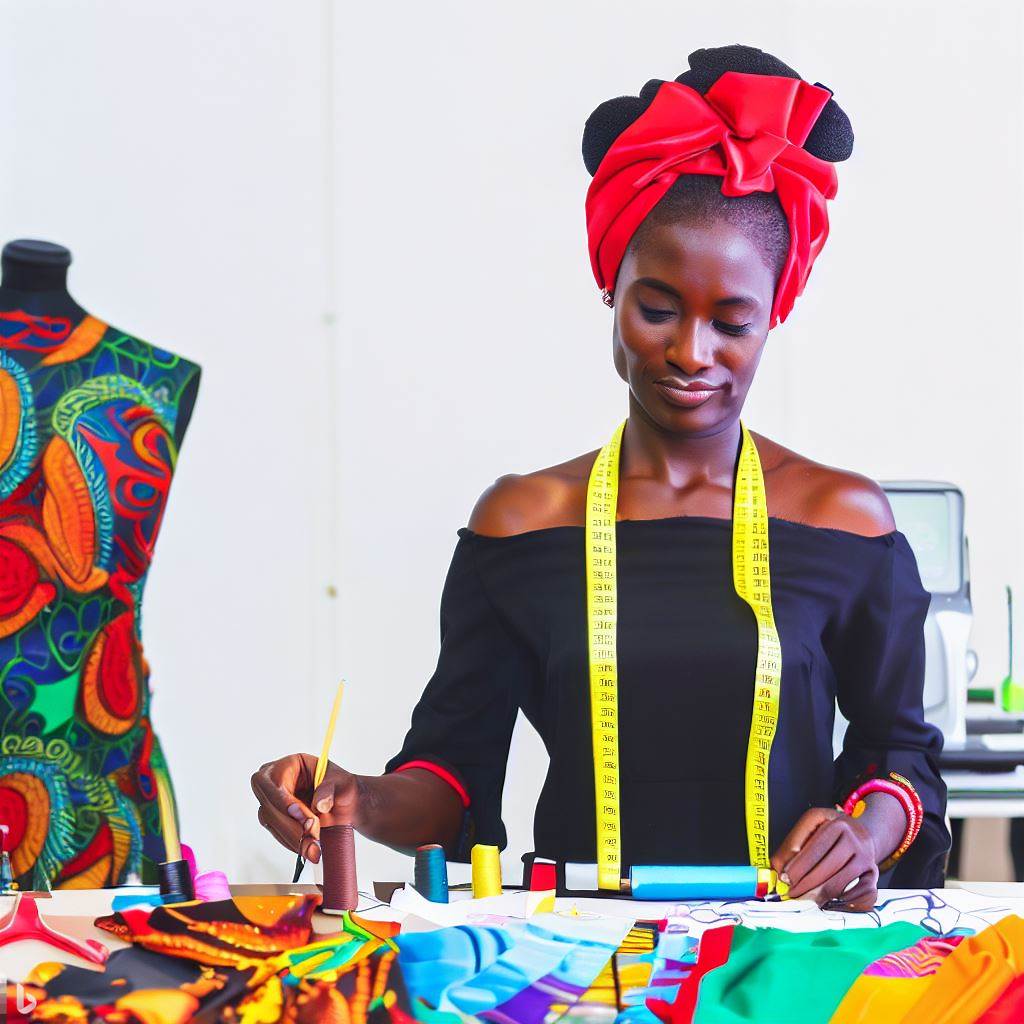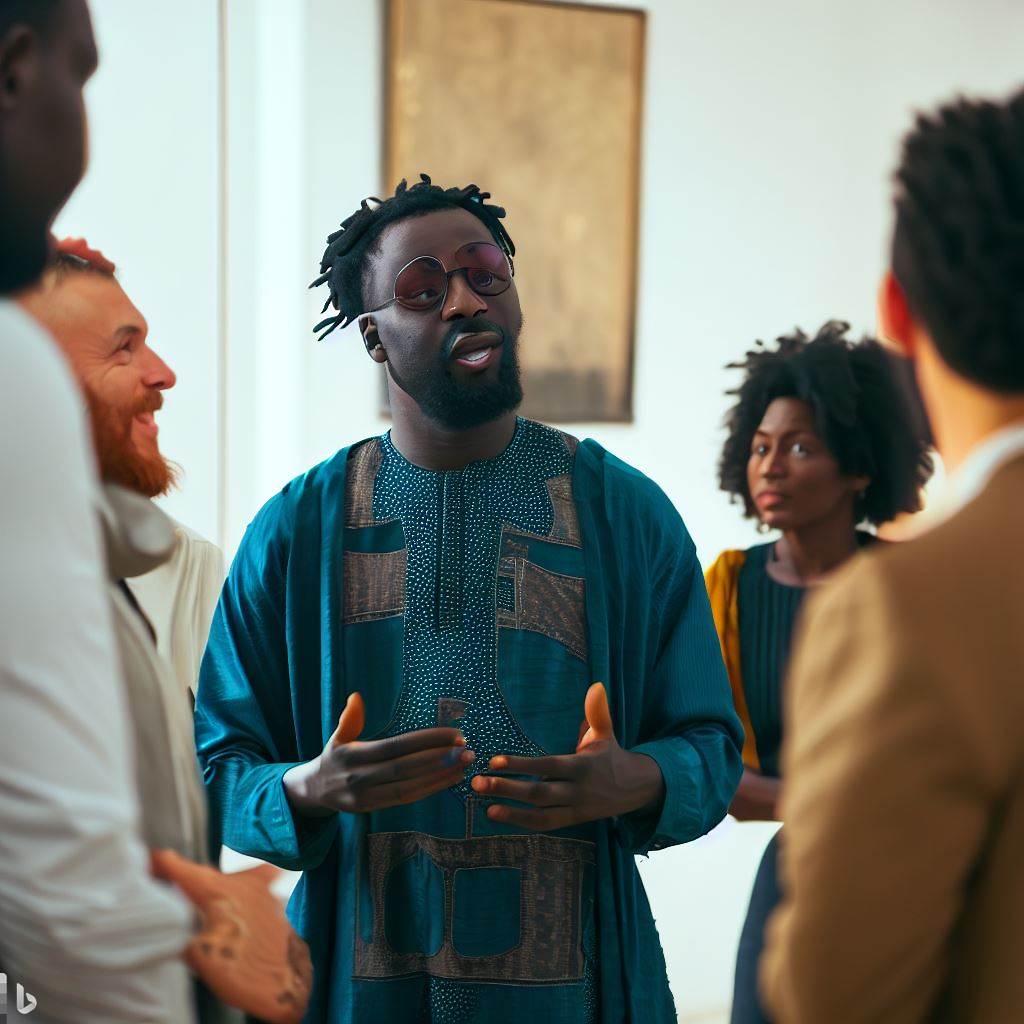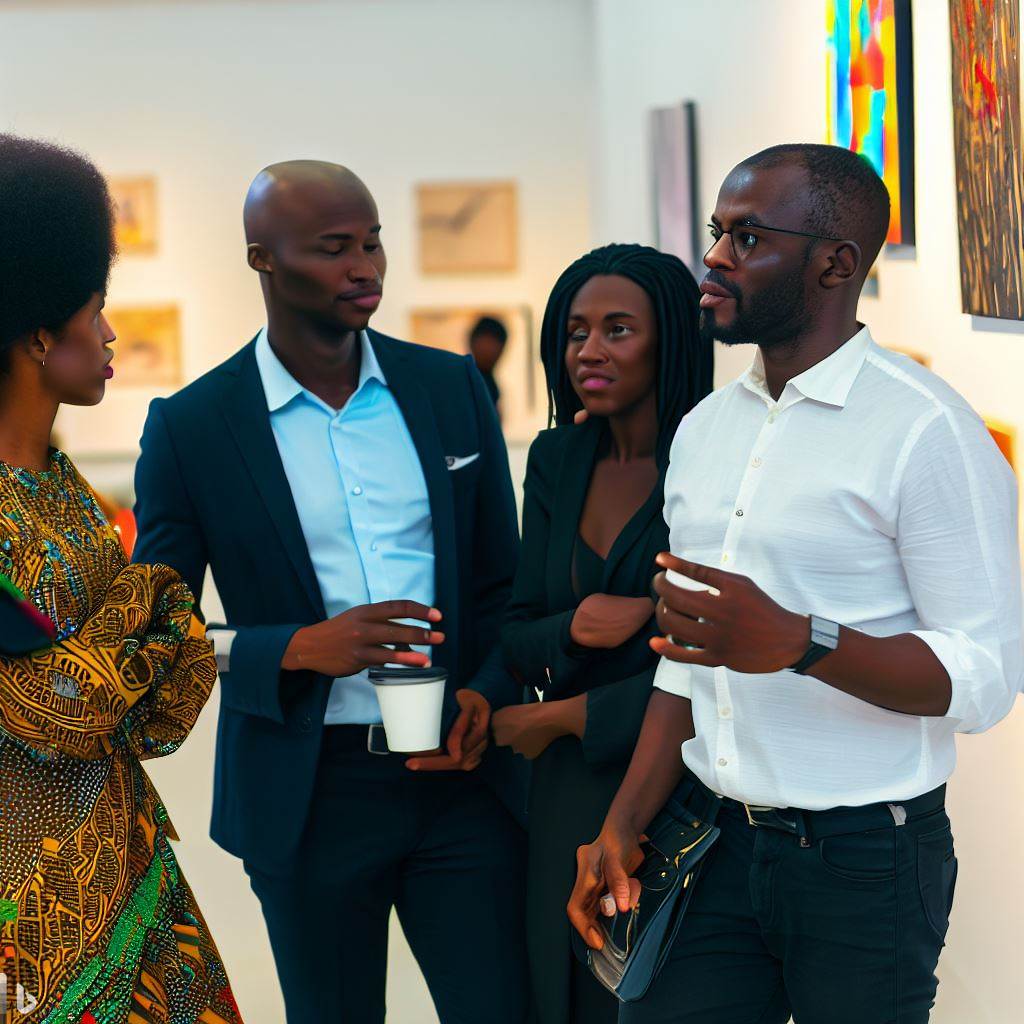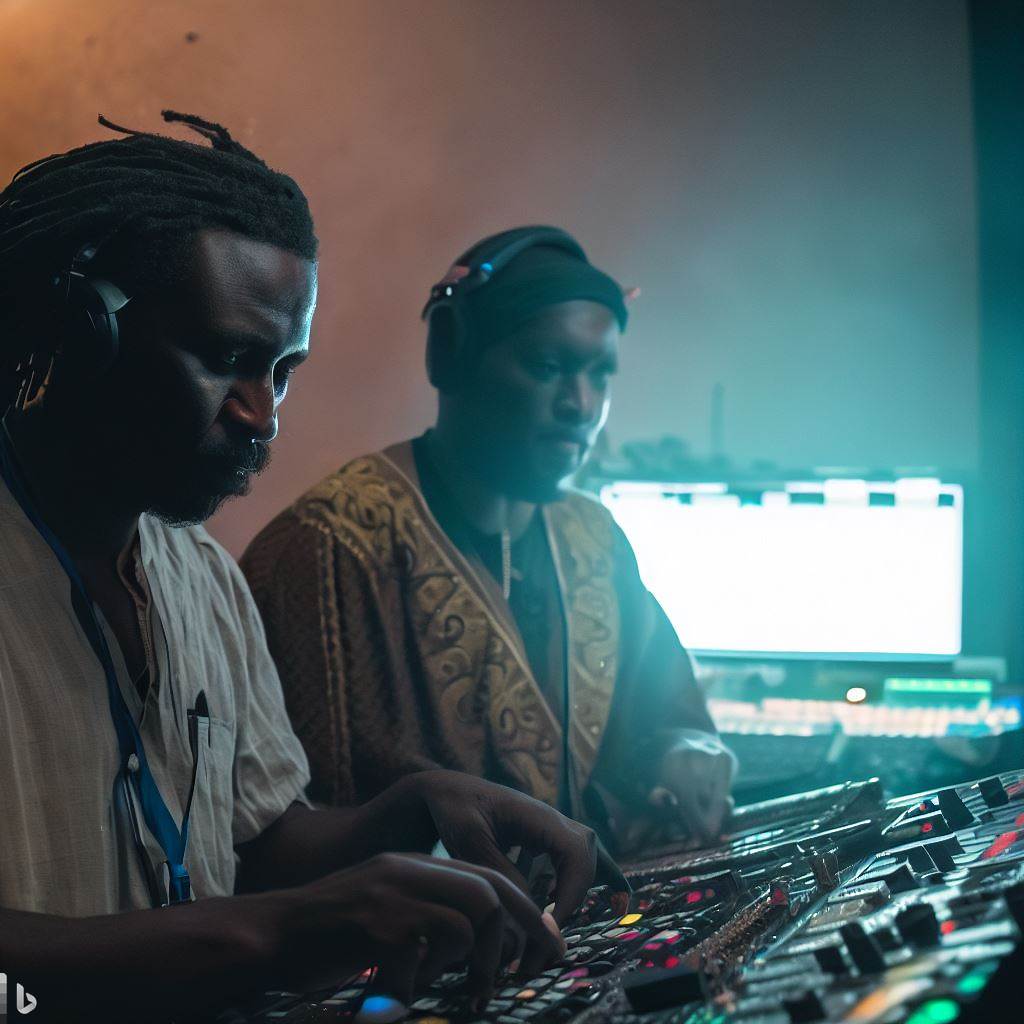Introduction
The topic of rising stars in Nigeria’s costume design industry
The costume design industry in Nigeria is flourishing, with rising stars making their mark.
The nation’s emerging costume designers are making a significant impact.
- Creative Ingenuity: Rising designers infuse innovation and cultural richness into their creations.
- Global Spotlight: Nigerian designers are gaining international recognition, showcasing the country’s artistic prowess.
- Unique Cultural Blend: The fusion of tradition and modernity distinguishes Nigeria’s emerging costume designers.
- Fashion Forward: These rising stars are reshaping the costume design landscape, setting trends and pushing boundaries.
The growing recognition of Nigerian designers on the global stage signals a promising future for the country’s costume design industry.
The increasing recognition of Nigerian designers globally
Nigerian designers are gaining global recognition, showcasing their talent on an international stage.
Background of the Nigerian Costume Design Industry
An overview of the history and development of the costume design industry in Nigeria
The Nigerian costume design industry has a rich background and a vibrant history. It has evolved over the years to become one of the most prominent and influential industries in the country.
Nigerian costume designers have been able to capture the essence of Nigerian culture and showcase it to the world through their designs.
These designers are rising stars in the industry, pushing boundaries and redefining Nigerian fashion.
The history of the Nigerian costume design industry dates back to pre-colonial times when clothing was primarily made from locally sourced materials such as cotton, silk, and leather.
Traditional costumes were intricately woven and adorned with beautiful embroidery and patterns, reflecting the cultural diversity of the Nigerian people.
These costumes were not only a form of self-expression but also a symbol of status and identity.
With the advent of colonialism, Nigerian fashion began to see influences from Western styles. Traditional costumes were combined with European elements to create a unique fusion of styles.
This fusion became the foundation for modern Nigerian fashion and costume design.
In recent years, Nigerian costume designers have gained international recognition for their unique designs and innovative use of fabrics.
Designers like Deola Sagoe, Lisa Folawiyo, and Mai Atafo have showcased their collections on global runways, bringing the Nigerian fashion industry into the spotlight.
The cultural significance and diversity of Nigerian costumes
One of the defining characteristics of Nigerian costumes is their cultural significance. Each ethnic group in Nigeria has its own distinct traditional costumes that are deeply rooted in their history and cultural practices.
These costumes are not simply garments; they tell stories, convey messages, and serve as a form of cultural preservation.
- The diversity of Nigerian costumes is also worth mentioning. Nigeria is home to over 250 ethnic groups, each with its own unique cultural practices and traditions.
- This diversity is reflected in the costumes, with different regions showcasing their distinctive styles and motifs.
- From the intricately woven Aso Oke of the Yoruba people to the colorful Igbo traditional attire, Nigerian costumes are a celebration of cultural diversity.
- Nigerian costume designers have played a crucial role in promoting and preserving Nigerian culture through their designs.
- They have taken traditional costumes and reimagined them in modern and contemporary ways, making them relevant to a new generation.
- These designers have also helped to create job opportunities for local artisans and craftspeople, contributing to the growth of the Nigerian economy.
In short, the Nigerian costume design industry has a rich history and a vibrant present. It has evolved from traditional costumes to a thriving industry that is gaining global recognition.
The cultural significance and diversity of Nigerian costumes make them unique and appealing. Nigerian costume designers are rising stars, pushing boundaries and redefining Nigerian fashion.
They have successfully captured the essence of Nigerian culture and showcased it to the world through their innovative designs.
Read: Inside the Studio: The Life of a Nigerian Mixing Engineer
Importance of Costume Designers in Nigerian Entertainment Industry
Role of costume designers in Nigerian movies, music videos, and theater productions
Costume designers play a crucial role in the Nigerian entertainment industry, adding depth and authenticity to films, music videos, and theater productions.
How costume design contributes to storytelling and character development
Their work goes beyond selecting costumes; they contribute to storytelling and character development, making their presence invaluable.
Contributing to Nigerian Movies
Costume designers are instrumental in creating believable characters in Nigerian movies.
- They carefully choose costumes that reflect the time period, location, and cultural background of each character, enhancing the overall visual experience for the audience.
- Through their choices, they help transport viewers into the story’s world.
- Not only do costume designers choose costumes, but they also make them.
- This effort ensures that costumes fit the actors perfectly and align with the director’s vision.
- They pay attention to details like fabric, color, and accessories, as all these elements contribute to the character’s authenticity.
- Further, costume designers work closely with hairstylists and makeup artists to create a cohesive look for each character.
- They collaborate to ensure the costumes, hair, and makeup come together harmoniously to enhance the storytelling.
Enhancing Music Videos
Costume designers also have a significant impact on Nigerian music videos.
- They collaborate with artists and directors to create visual narratives that complement the music.
- Through their expertise, they can bring out the essence of the song and the artist’s persona.
- Music videos often tell a story or convey a specific message. Costume designers play a critical role in translating these narratives visually.
- By selecting costumes that reflect the mood, style, and themes of the song, they help create a more immersive experience for the audience.
- Moreover, costume designers in music videos often push boundaries and introduce innovative styles, setting fashion trends and inspiring viewers.
- They have the ability to make a strong fashion statement and influence popular culture through their designs.
Enriching Theater Productions
Theater productions heavily rely on costume designers to transport the audience to different worlds and time periods.
- Unlike movies or music videos, theater costumes need to withstand live performances and convey the characters’ personalities to large audiences.
- Costume designers for theater productions have the challenge of working with limited resources.
- However, their creativity shines through as they find innovative ways to bring the characters to life.
- They often collaborate closely with theater directors and performers to create costumes that enhance the emotional impact of the play.
- In addition to selecting or making costumes, theater costume designers also consider practicality.
- They design outfits that allow performers to move comfortably on stage and make quick costume changes if necessary.
Costume designers play a vital role in the Nigerian entertainment industry.
Through their choices and designs, they help build believable characters, create visual narratives, and transport audiences to different worlds.
Their contributions to Nigerian movies, music videos, and theater productions are crucial in enhancing the overall experience and storytelling.
Without their creativity and expertise, the entertainment industry in Nigeria would not be as vibrant and immersive.
Read: The Impact of Nollywood on Sound Editing in Nigeria
Profiles of Top Emerging Costume Designers in Nigeria
Nigeria’s fashion industry is witnessing the rise of talented costume designers who are making waves with their unique styles and contributions.
Spotlight the work and achievements of at least three rising stars in the industry
In this blog section, we will shine a spotlight on three rising stars in the industry, delving into their backgrounds, education, notable projects, and the impact they are making.
- Kemi Ojo – A Visionary with Impeccable Designs
Kemi Ojo is a young costume designer who is gaining recognition for her impeccable designs. - Adeola Wilson – Redefining Nigerian Fashion with Boldness
Adeola Wilson is a trailblazing costume designer who is redefining Nigerian fashion with her boldness and innovative approach. - Chikezie Nwabuko – Bridging Tradition and Modernity
Chikezie Nwabuko is a rising star in the Nigerian costume design scene, known for his ability to bridge tradition and modernity.
Information on their background, education, and notable projects
Kemi Ojo
Born and raised in Lagos, Nigeria, Kemi grew up surrounded by vibrant colors and diverse cultures, which greatly influenced her artistic perspective.
With a background in fashion design from a prestigious fashion school in Lagos, Kemi possesses a deep understanding of textiles and fabric manipulation.
Her attention to detail and ability to create memorable pieces have earned her accolades in the industry.
One of Kemi’s notable projects was working as the lead costume designer for a critically acclaimed Nigerian movie.
Her designs seamlessly blended traditional Nigerian patterns with a modern twist, capturing the essence of the film’s storyline and characters.
Adeola Wilson
Hailing from Abuja, Nigeria, Adeola’s passion for fashion and costume design began at a young age.
After completing her education in costume design at a renowned university, Adeola honed her skills by working as an apprentice under established costume designers.
This experience not only sharpened her technical abilities but also exposed her to the intricacies of the industry.
Adeola’s notable project includes designing costumes for a major Nigerian music video.
Her unconventional and avant-garde designs catapulted the video to international acclaim, showcasing her ability to push boundaries and challenge norms.
Chikezie Nwabuko
Raised in Enugu, Nigeria, Chikezie developed a deep appreciation for Nigeria’s diverse textiles and craftsmanship.
Chikezie’s educational background includes a degree in fashion design from a renowned university in Nigeria.
His training equipped him with the skills to combine traditional craftsmanship techniques with contemporary aesthetics.
One of Chikezie’s notable projects involved designing costumes for a Nigerian theater production that explored the country’s traditional folklore.
His exquisite attention to detail and intricate use of indigenous fabrics breathed life into the characters, capturing the essence of Nigerian culture.
Their unique styles and contributions to the industry
Kemi Ojo
Kemi’s unique style lies in her ability to infuse Nigerian culture into her designs while keeping them contemporary.
She believes that costumes should tell a story and evoke emotions, breathing life into characters on screen.
Adeola Wilson
Known for her audacious use of vibrant colors and exaggerated silhouettes, Adeola’s style is distinctively Nigerian, embracing the country’s rich cultural heritage while adding her own modern twist.
Her designs exude confidence and celebrate individuality.
Chikezie Nwabuko
Chikezie’s style is characterized by its fusion of traditional Nigerian elements, such as intricate beadwork and hand-dyed fabrics, with modern silhouettes.
He believes in preserving Nigerian heritage through fashion and showcasing the country’s talent on a global stage.
In summary, Nigeria’s fashion industry is bursting with emerging costume designers who are making a mark with their unique styles and contributions.
Kemi Ojo, Adeola Wilson, and Chikezie Nwabuko represent the future of Nigerian fashion, each bringing their own distinct flair to the industry.
As their careers continue to thrive, it is clear that these rising stars are poised to make lasting impacts on the global fashion scene.
Read: Media Laws and Ethics for Journalists in Nigeria

Challenges Faced by Emerging Costume Designers
Limited Funding
Emerging costume designers in Nigeria often face the challenge of limited funding for their projects. With little financial support, it becomes difficult for them to bring their creative visions to life.
Lack of Resources
Another hurdle faced by rising costume designers is the scarcity of resources.
They often struggle to find the necessary materials, fabrics, and tools to create their designs, hindering their growth and productivity.
Inadequate Equipment
Without access to proper equipment, emerging costume designers find it challenging to execute their designs effectively.
The lack of modern sewing machines, cutting tables, and other specialized tools limits their ability to produce high-quality costumes.
Limited Industry Exposure
Many emerging costume designers in Nigeria struggle with the lack of industry exposure and recognition.
They find it difficult to showcase their work and reach a wider audience, which hampers their career progression.
Absence of Mentorship
The absence of mentorship programs tailored specifically for costume designers poses a significant obstacle.
Young designers often lack guidance and support from experienced professionals in the field, hindering their artistic and professional development.
Competition
The costume design industry in Nigeria is highly competitive, making it challenging for emerging designers to stand out.
The saturated market often leads to limited opportunities and makes it harder for them to secure clients and projects.
Limited Education and Training
Many emerging costume designers face the challenge of limited access to formal education and training programs.
This lack of structured learning opportunities hampers their technical skills and knowledge, inhibiting their growth in the industry.
Cultural Stereotyping
Costume designers in Nigeria often struggle with cultural stereotypes, especially when trying to incorporate traditional elements into their designs.
These stereotypes can limit creative freedom and discourage innovation.
Social Stigma
In a society where traditional career paths are favored, emerging costume designers may face social stigma.
Their choice of pursuing a creative profession can be viewed as unconventional, leading to societal pressures and skepticism.
Market Demands and Trends
Keeping up with ever-changing market demands and trends can be a significant challenge for emerging costume designers.
They must constantly update their skills and stay relevant to meet the expectations of their target audience.
Despite these challenges, emerging costume designers in Nigeria continue to push boundaries and make their mark in the industry.
With determination, resilience, and support from the community, they overcome these obstacles one step at a time, contributing to the growth and recognition of Nigerian costume design on a global scale.
Read: Nigeria’s Makeup Artists and the Use of Social Media for Growth
Opportunities for Growth and Recognition
Recent initiatives and platforms supporting emerging Nigerian costume designers
Rise of Recent Initiatives
- Lagos Fashion Week: Showcasing emerging Nigerian costume designers and giving them a platform for exposure.
- Nigeria’s Next Top Designer: A competition that provides opportunities for young designers to showcase their talents.
- African Fashion Week Nigeria: An event that celebrates the creativity of emerging costume designers in the industry.
Supportive Platforms
- Fashion Designers Association of Nigeria (FADAN): Offers mentorship programs and business support for emerging designers.
- Nigerian Entertainment Conference: A platform that discusses the growth and development of the costume design industry.
Government Support and Incentives
- Funding Initiatives: Government schemes that offer financial support for emerging designers to kick-start their businesses.
- Trade Policies: Government policies that promote the export of African-inspired fashion and costumes.
Influence of Nigerian Celebrities
- Style Icons: Nigerian celebrities like Genevieve Nnaji and Burna Boy promoting African fashion and costumes globally.
- Red Carpet Events: Celebrities wearing Nigerian designers’ costumes at international events create a significant buzz.
Social Media and E-commerce Platforms
- Increased Visibility: Leveraging platforms like Instagram and Facebook to showcase designs to a global audience.
- Direct Sales: Offering online shopping options for customers worldwide, boosting sales and exposure.
Networking and Industry Events
- Workshops and Seminars: Attending events where industry professionals share insights and network with peers.
- Fashion Exhibitions: Showcasing designs at exhibitions allows costume designers to connect with potential buyers and collaborators.
Recognition and Awards
- Africa Fashion Awards: Recognizing and honoring outstanding achievements in the African fashion industry.
- National Costume Design Awards: Celebrating the talents and contributions of Nigerian costume designers.
The growing demand for African-inspired fashion and costumes globally
- Diaspora Influence: The African diaspora’s increasing interest in reconnecting with their roots through African-inspired fashion.
- Global Media Exposure: Popular culture and social media platforms have brought African fashion to the attention of the international market.
- Cultural Appreciation: The beauty and uniqueness of African fabrics and designs are now being recognized globally.
Expanding Market Opportunities
- Film and Entertainment Industry: Increasing demand for African-inspired costumes in international movies and TV productions.
- Music Industry: Collaborations between Nigerian costume designers and international musicians for music videos and performances.
- Fashion Retail: African-inspired fashion gaining popularity in mainstream fashion stores worldwide.
Collaboration opportunities with international designers and production companies
- International Designers: Partnerships with established international designers can provide exposure and new perspectives.
- Production Companies: Collaboration with production companies opens doors for Nigerian designers to work on international projects.
- Fashion Weeks Abroad: Showcasing Nigerian costume designs at renowned fashion weeks worldwide attracts global recognition.
In general, Nigeria’s costume design industry is experiencing a promising rise.
With various initiatives, supportive platforms, growing demand for African-inspired fashion, and collaboration opportunities, emerging Nigerian designers have significant opportunities for growth, recognition, and global success.
The industry’s continuous development, coupled with government support, celebrity influence, and online platforms, provides a fertile ground for costume designers to showcase their talent and creativity on a global stage.
Read: Career Progression for Artists’ and Performers’ Agents
Recommendations for Aspiring Costume Designers
Advice and tips for aspiring costume designers in Nigeria
Develop a Unique Style
While staying updated with trends is important, cultivating a unique and distinctive style is equally crucial.
Experiment with different techniques, materials, and inspirations to develop your personal design aesthetic.
Understand the Characters
To create impactful costumes, aspiring designers must thoroughly understand the characters they are dressing.
Study the script, analyze the personality traits, and visualize how the costumes can enhance the character’s narrative.
Collaborate with other Creatives
Collaboration is key in the costume design industry.
Build relationships with directors, producers, makeup artists, and actors to create a cohesive visual representation of the story you are working on.
Budget Management
Aspiring costume designers should learn to work within budget constraints.
Develop cost-effective strategies, source materials wisely, and find creative solutions to design costumes that meet the production’s financial requirements.
Adaptability
The ability to adapt to different styles, eras, and genres is crucial for costume designers. Be open to experimentation and willing to embrace diverse design challenges to showcase your versatility.
Attention to Detail
Pay meticulous attention to detail in every aspect of costume design, from fabric selection to trims and embellishments.
Every small detail contributes to the overall impact of the costume on the screen or stage.
Encourage Feedback and Criticism
Aspiring costume designers should welcome feedback and criticism from mentors, peers, and collaborators.
Constructive criticism helps improve your skills and aids in identifying areas for growth and refinement.
Market and Promote Yourself
Develop a strong online presence by creating a professional portfolio and showcasing your work on social media platforms and websites.
Attend industry events and exhibit your designs to gain recognition and attract potential clients.
Build Resilience
The journey of a costume designer can be challenging, with ups and downs.
Build resilience, persevere through setbacks, and learn from failures to emerge stronger and more determined in your craft.
Never Stop Learning
Costume design is a constantly evolving field.
Stay curious, seek continuous learning opportunities, and adapt to new techniques, technologies, and design aesthetics to remain relevant and successful.
Embrace Diversity and Inclusion
Inclusive costume design is essential in representing the diverse society of Nigeria.
Embrace diversity in your designs, be mindful of cultural sensitivities, and celebrate the beauty of Nigerian heritage in your creations.
Be Passionate and Persistent
Passion and persistence are the driving forces behind successful costume designers.
Stay enthusiastic about your craft, embrace challenges, and pursue your dreams wholeheartedly.
Importance of skill development, networking, and staying informed about industry trends
- Embrace Skill Development: Aspiring costume designers in Nigeria should focus on honing their skills through continuous learning and practice.
Participate in workshops, courses, and internships to enhance your expertise. - Foster Networking: Building a strong professional network is crucial for success in the costume design industry.
Attend industry events, join design associations, and connect with fellow designers and industry professionals. - Stay Informed about Industry Trends: To stay relevant and competitive, aspiring costume designers must keep up with the latest industry trends.
Follow fashion blogs, read design magazines, and attend fashion shows and exhibitions to stay informed.
By following these recommendations, aspiring costume designers in Nigeria can navigate their way to becoming successful professionals in the industry.
Publish Your Professional Profile, Business or Brand
Showcase your expertise, gain trust, and boost visibility instantly on Professions.ng.
Publish NowRemember, it takes dedication, creativity, and a constant thirst for knowledge to excel as a costume designer, but the rewards are undoubtedly fulfilling.
Read: Balancing Free Speech and Reporting in Nigeria
Conclusion
Recap the significance of rising stars in Nigeria’s costume design industry
Rising stars in Nigeria’s costume design industry play a significant role. They bring fresh perspectives, creativity, and innovation that breathe new life into Nigeria’s cultural representation and creative economy.
The potential impact of these designers on Nigeria’s cultural representation and creative economy
These emerging designers have the potential to make a lasting impact and shape the future of Nigeria’s fashion industry on a global scale.
By supporting and celebrating these young talents, we can help them flourish and succeed in their chosen field. It is crucial to recognize and appreciate their hard work, dedication, and unique contributions.
With our support, they can continue to push boundaries, challenge norms, and create designs that capture the essence of Nigerian culture while also appealing to a broader audience.
As consumers, we have the power to shape the industry by choosing to patronize and promote emerging designers.
By seeking out and purchasing their creations, we are not only supporting their dreams but also contributing to the growth and development of Nigeria’s creative sector.
Encourage readers to support and celebrate emerging costume designers in Nigeria
Let us celebrate the rising stars of Nigeria’s costume design industry, applaud their achievements, and recognize their potential.
Through our encouragement, they can continue to showcase the richness and vibrancy of Nigerian culture through their exceptional designs.
Let us embrace the talent, passion, and innovation of these emerging costume designers in Nigeria.
Together, we can create a thriving industry that represents our cultural heritage and contributes to Nigeria’s creative economy.
So, let’s support and celebrate these rising stars as they shape the future of fashion in Nigeria.



